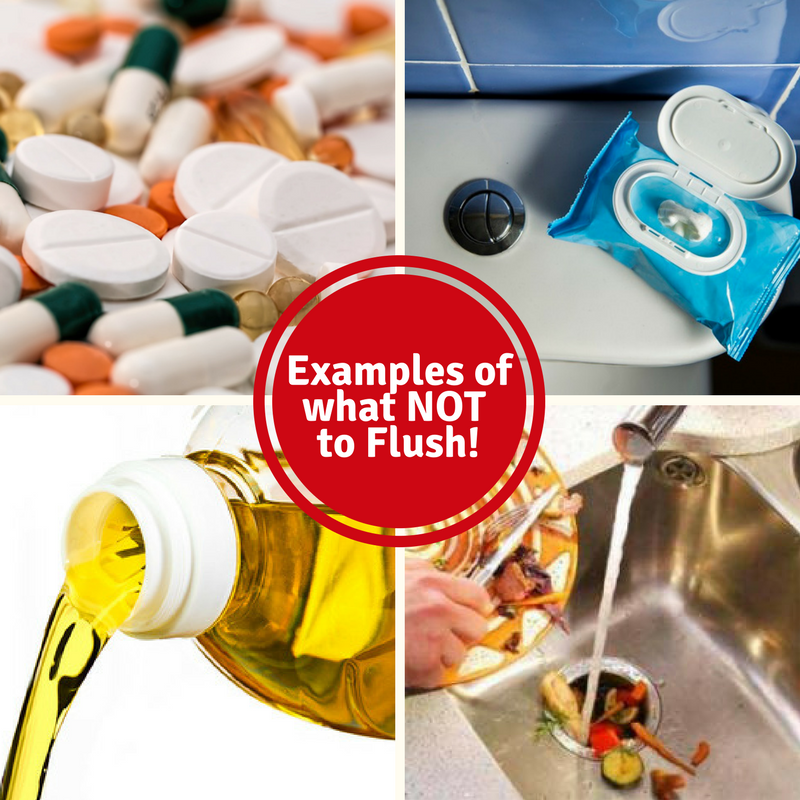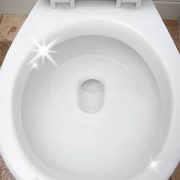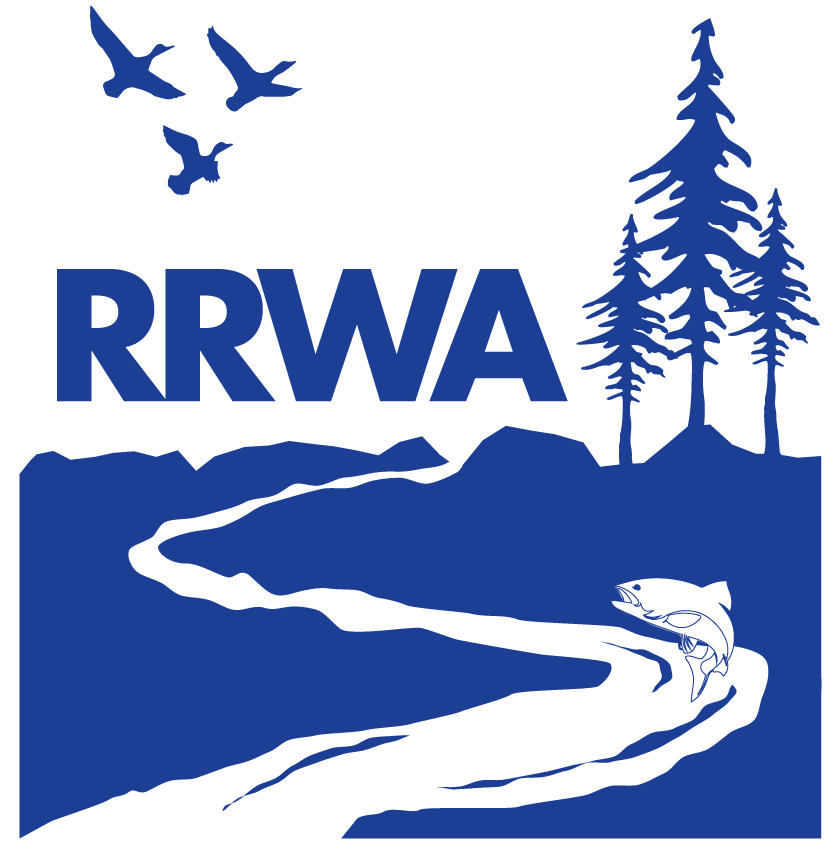Is your toilet also a Trash Can? No!
Most things do not belong in the toilet. In fact, it is easier to list what can go in: water, toilet paper, pee and poo (the three P’s).
However, many people seem to think the sanitary sewer system is a way to get rid of all kinds of waste. Drop it down the drain and it is out of sight, out of mind. What can go wrong? Plenty. Every time materials besides human waste and toilet paper get into our sewer system, it costs the community. These materials can clog the pipes and disrupt the wastewater treatment process. The clogging can back up sewer pipes and damage homes and businesses, as well as drive up sewer maintenance costs and increase sewer bills.

Can I pour my cooking grease down the kitchen sink?
No. It is never OK to put fats, oils, and grease down the drain. Grease poured down the sink (or into the garbage disposal) will cool and harden, leading to unpleasant odors and blockages in your pipes. Instead, pour excess grease into a container with a tight-fitting lid for storing. Use a scraper or spatula to remove all the grease from the pan. Freeze it, or allow it to harden on its own, and throw the hardened oil away on trash day. For more information, see www.rrwatershed.org/project/fats-oils-and-grease.
Expired medicines can be flushed down, right?
No. Recent studies of our nations’ waterways have shown that flushing pharmaceuticals down the toilet or dumping them in the trash might be setting the stage for environmental and human health problems. Medicines should be brought to a local drug take-back site. Visit www.rrwatershed.org/project/safe-medicine-disposal to learn how to properly dispose of unwanted medications.
I’ve heard that disposable wipes must go in the trash, but if the package says “flushable” then is it OK to flush it in the toilet?
No. Tests have shown that “flushable” wipes do not degrade readily like toilet paper. Many municipalities around the state, country, and world are experiencing serious and costly problems with “flushable” products within their sewer systems. Even paper towels and tissues can’t break down fast enough if flushed down the toilet. An option for reducing the waste of these wipes is to use sponges or rags that can be washed and reused.
Can old cleaning or personal care products be emptied into the toilet before I put the containers in the trash?
No. Household hazardous materials should not be flushed because they do break down in water. Dissolved chemicals can travel through the sewer system and pollute the Russian River and the marine environment. Hazardous chemical products, such as antifreeze, batteries or motor oil, as well as solvents, bleach, nail polish, all cleaners, disinfectants, pesticides, polishes, stain removers, fabric softeners, ammonia, dryer sheets, hair care products, fragrances, skin care products, cosmetics, lotions, and more should be taken to a local household hazardous waste disposal site. For information regarding disposal of hazardous materials, including local disposal centers, visit www.recyclenow.org for Sonoma County and www.mendorecycle.org for Mendocino County.
Purchase products made with natural ingredients and avoid products that use chemicals like those mentioned above. For more information and ideas on safer cleaning and living products, visit Sebastopol Toxics Education Program (STEP) at www.healthyworld.org/STEPIndex.html or Community Action Publications at www.healthyworld.org.
I have a food sink. Can I dump food waste down the sink with no problems?
No. A large mass of food waste, even ground up, moving through the sanitary sewer pipes can mix with trash, grease, tree roots, and more to block a pipe. Small amounts are OK to keep your drain flowing, but your drain is not a garbage can. Food waste is compostable, and when combined with mulch are great for your garden.
I’ve heard it is acceptable to clean painting equipment like brushes and rollers in the sink?
It depends. For Latex water-based paints, remove as much of the paint off the painting tools onto a newspaper before washing them in the sink. Oil-based paints and solvents must be treated as hazardous waste. For information regarding disposal of hazardous materials and paint, including local disposal centers, visit www.recyclenow.org for Sonoma County and www.mendorecycle.org for Mendocino County.
So, no trash should be flushed down the toilet or any drain?
Yes! Do not flush items like hair, wrappers, toys, cotton balls, feminine hygiene products, rags, dental floss, cigarette butts, dust/dirt/lint, rubber gloves, bandages, any plastic, condoms, under-wear, and cat litter. This is just a small sample of the items found in the sanitary sewer system. Consider donating gently used clothing and toys. Determine if your plastic can be recycled; if not, then throwing it away. Any remaining waste can be placed in the trash to save yourself time, money, and stress while protecting your home, environment, and community.




